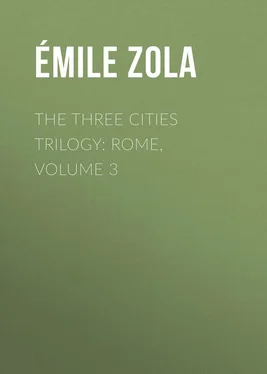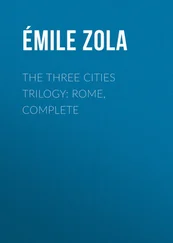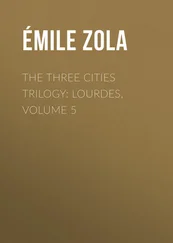Émile Zola - The Three Cities Trilogy - Rome, Volume 3
Здесь есть возможность читать онлайн «Émile Zola - The Three Cities Trilogy - Rome, Volume 3» — ознакомительный отрывок электронной книги совершенно бесплатно, а после прочтения отрывка купить полную версию. В некоторых случаях можно слушать аудио, скачать через торрент в формате fb2 и присутствует краткое содержание. Жанр: literature_19, foreign_antique, foreign_prose, на английском языке. Описание произведения, (предисловие) а так же отзывы посетителей доступны на портале библиотеки ЛибКат.
- Название:The Three Cities Trilogy: Rome, Volume 3
- Автор:
- Жанр:
- Год:неизвестен
- ISBN:нет данных
- Рейтинг книги:3 / 5. Голосов: 1
-
Избранное:Добавить в избранное
- Отзывы:
-
Ваша оценка:
- 60
- 1
- 2
- 3
- 4
- 5
The Three Cities Trilogy: Rome, Volume 3: краткое содержание, описание и аннотация
Предлагаем к чтению аннотацию, описание, краткое содержание или предисловие (зависит от того, что написал сам автор книги «The Three Cities Trilogy: Rome, Volume 3»). Если вы не нашли необходимую информацию о книге — напишите в комментариях, мы постараемся отыскать её.
The Three Cities Trilogy: Rome, Volume 3 — читать онлайн ознакомительный отрывок
Ниже представлен текст книги, разбитый по страницам. Система сохранения места последней прочитанной страницы, позволяет с удобством читать онлайн бесплатно книгу «The Three Cities Trilogy: Rome, Volume 3», без необходимости каждый раз заново искать на чём Вы остановились. Поставьте закладку, и сможете в любой момент перейти на страницу, на которой закончили чтение.
Интервал:
Закладка:
For the ceremony on the following day, it was fortunate that Pierre held a private ticket which admitted him to a reserved gallery, for the scramble at the entrances to the Basilica proved terrible. The mass, which the Pope was to celebrate in person, was fixed for ten o'clock, but people began to pour into St. Peter's four hours earlier, as soon, indeed, as the gates had been thrown open. The three thousand members of the International Pilgrimage were increased tenfold by the arrival of all the tourists in Italy, who had hastened to Rome eager to witness one of those great pontifical functions which nowadays are so rare. Moreover, the devotees and partisans whom the Holy See numbered in Rome itself and in other great cities of the kingdom, helped to swell the throng, all alacrity at the prospect of a demonstration. Judging by the tickets distributed, there would be a concourse of 40,000 people. And, indeed, at nine o'clock, when Pierre crossed the piazza on his way to the Canons' Entrance in the Via Santa Marta, where the holders of pink tickets were admitted, he saw the portico of the facade still thronged with people who were but slowly gaining admittance, while several gentlemen in evening dress, members of some Catholic association, bestirred themselves to maintain order with the help of a detachment of Pontifical Guards. Nevertheless, violent quarrels broke out in the crowd, and blows were exchanged amidst the involuntary scramble. Some people were almost stifled, and two women were carried off half crushed to death.
A disagreeable surprise met Pierre on his entry into the Basilica. The huge edifice was draped; coverings of old red damask with bands of gold swathed the columns and pilasters, seventy-five feet high; even the aisles were hung with the same old and faded silk; and the shrouding of those pompous marbles, of all the superb dazzling ornamentation of the church bespoke a very singular taste, a tawdry affectation of pomposity, extremely wretched in its effect. However, he was yet more amazed on seeing that even the statue of St. Peter was clad, costumed like a living pope in sumptuous pontifical vestments, with a tiara on its metal head. He had never imagined that people could garment statues either for their glory or for the pleasure of the eyes, and the result seemed to him disastrous.
The Pope was to say mass at the papal altar of the Confession, the high altar which stands under the dome. On a platform at the entrance of the left-hand transept was the throne on which he would afterwards take his place. Then, on either side of the nave, tribunes had been erected for the choristers of the Sixtine Chapel, the Corps Diplomatique, the Knights of Malta, the Roman nobility, and other guests of various kinds. And, finally, in the centre, before the altar, there were three rows of benches covered with red rugs, the first for the cardinals and the other two for the bishops and the prelates of the pontifical court. All the rest of the congregation was to remain standing.
Ah! that huge concert-audience, those thirty, forty thousand believers from here, there, and everywhere, inflamed with curiosity, passion, or faith, bestirring themselves, jostling one another, rising on tip-toe to see the better! The clamour of a human sea arose, the crowd was as gay and familiar as if it had found itself in some heavenly theatre where it was allowable for one to chat aloud and recreate oneself with the spectacle of religious pomp! At first Pierre was thunderstruck, he who only knew of nervous, silent kneeling in the depths of dim cathedrals, who was not accustomed to that religion of light, whose brilliancy transformed a religious celebration into a morning festivity. Around him, in the same tribune as himself, were gentlemen in dress-coats and ladies gowned in black, carrying glasses as in an opera-house. There were German and English women, and numerous Americans, all more or less charming, displaying the grace of thoughtless, chirruping birds. In the tribune of the Roman nobility on the left he recognised Benedetta and Donna Serafina, and there the simplicity of the regulation attire for ladies was relieved by large lace veils rivalling one another in richness and elegance. Then on the right was the tribune of the Knights of Malta, where the Grand Master stood amidst a group of commanders: while across the nave rose the diplomatic tribune where Pierre perceived the ambassadors of all the Catholic nations, resplendent in gala uniforms covered with gold lace. However, the young priest's eyes were ever returning to the crowd, the great surging throng in which the three thousand pilgrims were lost amidst the multitude of other spectators. And yet as the Basilica was so vast that it could easily contain eighty thousand people, it did not seem to be more than half full. People came and went along the aisles and took up favourable positions without impediment. Some could be seen gesticulating, and calls rang out above the ceaseless rumble of voices. From the lofty windows of plain white glass fell broad sheets of sunlight, which set a gory glow upon the faded damask hangings, and these cast a reflection as of fire upon all the tumultuous, feverish, impatient faces. The multitude of candles, and the seven-and-eighty lamps of the Confession paled to such a degree that they seemed but glimmering night-lights in the blinding radiance; and everything proclaimed the worldly gala of the imperial Deity of Roman pomp.
All at once there came a premature shock of delight, a false alert. Cries burst forth and circulated through the crowd: "Eccolo! eccolo! Here he comes!" And then there was pushing and jostling, eddying which made the human sea whirl and surge, all craning their necks, raising themselves to their full height, darting forward in a frenzied desire to see the Holy Father and the /cortege/. But only a detachment of Noble Guards marched by and took up position right and left of the altar. A flattering murmur accompanied them, their fine impassive bearing with its exaggerated military stiffness, provoking the admiration of the throng. An American woman declared that they were superb-looking fellows; and a Roman lady gave an English friend some particulars about the select corps to which they belonged. Formerly, said she, young men of the aristocracy had greatly sought the honour of forming part of it, for the sake of wearing its rich uniform and caracoling in front of the ladies. But recruiting was now such a difficult matter that one had to content oneself with good-looking young men of doubtful or ruined nobility, whose only care was for the meagre "pay" which just enabled them to live.
When another quarter of an hour of chatting and scrutinising had elapsed, the papal /cortege/ at last made its appearance, and no sooner was it seen than applause burst forth as in a theatre – furious applause it was which rose and rolled along under the vaulted ceilings, suggesting the acclamations which ring out when some popular, idolised actor makes his entry on the stage. As in a theatre, too, everything had been very skilfully contrived so as to produce all possible effect amidst the magnificent scenery of the Basilica. The /cortege/ was formed in the wings, that is in the Cappella della Pieta, the first chapel of the right aisle, and in order to reach it, the Holy Father, coming from his apartments by the way of the Chapel of the Blessed Sacrament, had been stealthily carried behind the hangings of the aisle which served the purpose of a drop-scene. Awaiting him in all readiness in the Cappella della Pieta were the cardinals, archbishops, and bishops, the whole pontifical prelacy, hierarchically classified and grouped. And then, as at a signal from a ballet master, the /cortege/ made its entry, reaching the nave and ascending it in triumph from the closed Porta Santa to the altar of the Confession. On either hand were the rows of spectators whose applause at the sight of so much magnificence grew louder and louder as their delirious enthusiasm increased.
Читать дальшеИнтервал:
Закладка:
Похожие книги на «The Three Cities Trilogy: Rome, Volume 3»
Представляем Вашему вниманию похожие книги на «The Three Cities Trilogy: Rome, Volume 3» списком для выбора. Мы отобрали схожую по названию и смыслу литературу в надежде предоставить читателям больше вариантов отыскать новые, интересные, ещё непрочитанные произведения.
Обсуждение, отзывы о книге «The Three Cities Trilogy: Rome, Volume 3» и просто собственные мнения читателей. Оставьте ваши комментарии, напишите, что Вы думаете о произведении, его смысле или главных героях. Укажите что конкретно понравилось, а что нет, и почему Вы так считаете.












